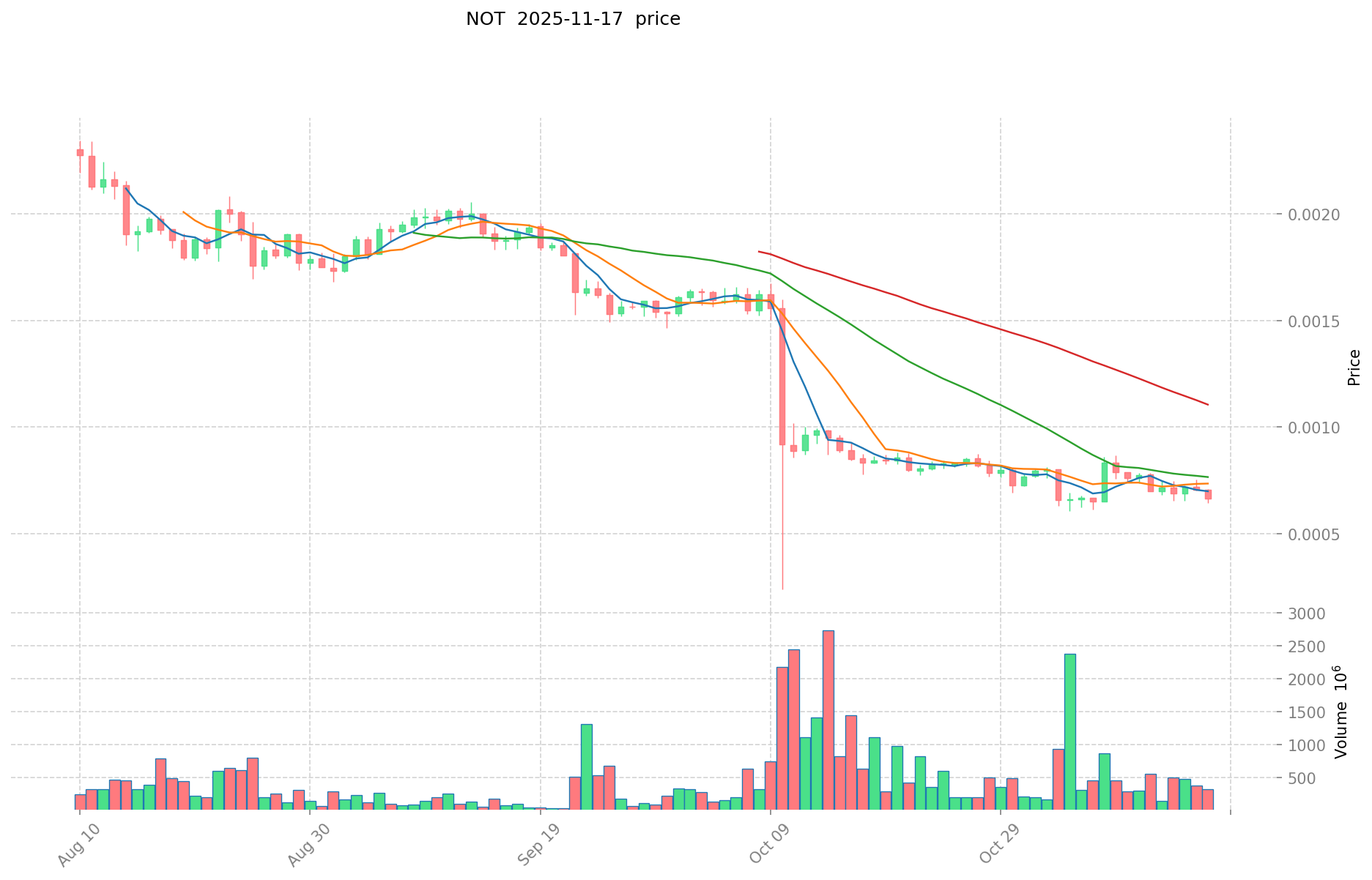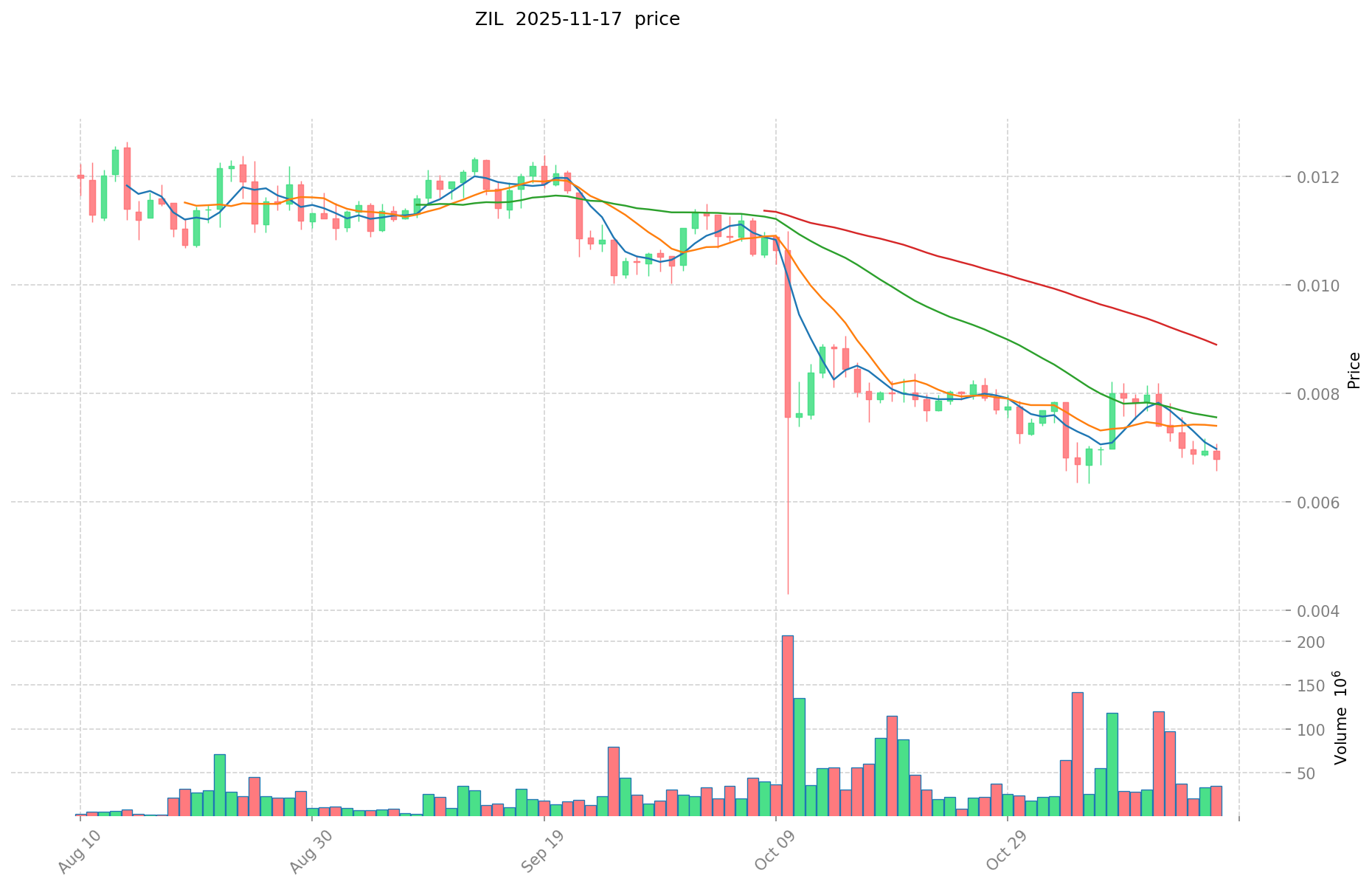NOT vs ZIL: The Battle of Blockchain Protocols for Smart Contract Platforms
Introduction: Investment Comparison of NOT vs ZIL
In the cryptocurrency market, the comparison between Notcoin vs Zilliqa has always been an unavoidable topic for investors. The two not only have significant differences in market cap ranking, application scenarios, and price performance, but also represent different positioning in crypto assets.
Notcoin (NOT): Since its launch, it has gained market recognition for its Telegram-based game that allows users to earn in-game tokens.
Zilliqa (ZIL): Since 2018, it has been hailed as a high-throughput public blockchain platform, aiming to solve transaction speed and scalability issues.
This article will comprehensively analyze the investment value comparison between NOT vs ZIL, focusing on historical price trends, supply mechanisms, institutional adoption, technological ecosystems, and future predictions, attempting to answer the question investors care most about:
"Which is the better buy right now?"
I. Price History Comparison and Current Market Status
NOT (Coin A) and ZIL (Coin B) Historical Price Trends
- 2024: NOT reached its all-time high of $0.02945 on June 2, 2024, likely due to increased adoption or a significant project milestone.
- 2021: ZIL hit its all-time high of $0.255376 on May 7, 2021, possibly influenced by the overall crypto market bull run.
- Comparative analysis: In the recent market cycle, NOT has fallen from its ATH of $0.02945 to a current price of $0.0006696, representing a significant decline. ZIL has also experienced a substantial drop from its ATH of $0.255376 to the current $0.006796.
Current Market Situation (2025-11-17)
- NOT current price: $0.0006696
- ZIL current price: $0.006796
- 24-hour trading volume: NOT $211,175.80 vs ZIL $222,462.97
- Market Sentiment Index (Fear & Greed Index): 10 (Extreme Fear)
Click to view real-time prices:
- Check NOT current price Market Price
- Check ZIL current price Market Price


II. Core Factors Affecting NOT vs ZIL Investment Value
Supply Mechanism Comparison (Tokenomics)
-
Notcoin (NOT): Limited total supply of 1.7 billion tokens with allocation distributed across ecosystem growth (21%), team (15%), and DAO treasury (64%)
-
Zilliqa (ZIL): Initial supply of 13 billion with annual token inflation through mining rewards that decreases over time
-
📌 Historical Pattern: Limited supply tokens like NOT tend to experience higher price volatility during bull markets, while inflationary models like ZIL's typically lead to more gradual price movements contingent on adoption metrics.
Institutional Adoption and Market Applications
- Institutional Holdings: ZIL has more established institutional presence with longer market history, while NOT is still in early adoption phase
- Enterprise Adoption: NOT focuses on gaming and social applications within the TON ecosystem; ZIL targets enterprise solutions in finance, gaming, and metaverse applications
- Regulatory Attitudes: Both tokens face varying regulatory scrutiny across jurisdictions, with NOT potentially benefiting from TON ecosystem's growing legitimacy
Technical Development and Ecosystem Building
- NOT Technical Development: Integration with TON blockchain providing fast transactions and low fees; developed using FunC programming language
- ZIL Technical Development: Utilizes sharding technology for scalability; implements Scilla programming language for secure smart contracts
- Ecosystem Comparison: NOT ecosystem primarily centers around gaming and Telegram integration within TON; ZIL has more diversified DeFi applications, NFT marketplaces, and established partnerships with gaming platforms
Macroeconomic Factors and Market Cycles
- Performance in Inflationary Environments: Limited supply tokens like NOT theoretically offer better hedge against inflation compared to ZIL's inflationary model
- Macroeconomic Monetary Policy: Both tokens show correlation with broader crypto market responses to interest rate changes, though newer tokens like NOT may display higher volatility
- Geopolitical Factors: NOT potentially benefits from TON's association with Telegram's global user base and cross-border capabilities
III. 2025-2030 Price Prediction: NOT vs ZIL
Short-term Prediction (2025)
- NOT: Conservative $0.00054594 - $0.000674 | Optimistic $0.000674 - $0.0009099
- ZIL: Conservative $0.0045828 - $0.00684 | Optimistic $0.00684 - $0.0097812
Mid-term Prediction (2027)
- NOT may enter a growth phase, with expected prices ranging from $0.00077547744 to $0.00100973625
- ZIL may enter a strong growth phase, with expected prices ranging from $0.0071554266 to $0.0116930142
- Key drivers: Institutional capital inflow, ETFs, ecosystem development
Long-term Prediction (2030)
- NOT: Base scenario $0.000977147012531 - $0.001149584720625 | Optimistic scenario $0.001149584720625 - $0.001402493359162
- ZIL: Base scenario $0.007789780997434 - $0.01469769999516 | Optimistic scenario $0.01469769999516 - $0.019107009993708
Disclaimer: This analysis is based on historical data and market projections. Cryptocurrency markets are highly volatile and unpredictable. This information should not be considered as financial advice. Always conduct your own research before making investment decisions.
NOT:
| 年份 | 预测最高价 | 预测平均价格 | 预测最低价 | 涨跌幅 |
|---|---|---|---|---|
| 2025 | 0.0009099 | 0.000674 | 0.00054594 | 0 |
| 2026 | 0.000823628 | 0.00079195 | 0.0004355725 | 18 |
| 2027 | 0.00100973625 | 0.000807789 | 0.00077547744 | 20 |
| 2028 | 0.00109051515 | 0.000908762625 | 0.00082697398875 | 35 |
| 2029 | 0.00129953055375 | 0.0009996388875 | 0.00085968944325 | 49 |
| 2030 | 0.001402493359162 | 0.001149584720625 | 0.000977147012531 | 71 |
ZIL:
| 年份 | 预测最高价 | 预测平均价格 | 预测最低价 | 涨跌幅 |
|---|---|---|---|---|
| 2025 | 0.0097812 | 0.00684 | 0.0045828 | 0 |
| 2026 | 0.00914166 | 0.0083106 | 0.005900526 | 22 |
| 2027 | 0.0116930142 | 0.00872613 | 0.0071554266 | 28 |
| 2028 | 0.013885018056 | 0.0102095721 | 0.008371849122 | 50 |
| 2029 | 0.01734810491232 | 0.012047295078 | 0.00686695819446 | 77 |
| 2030 | 0.019107009993708 | 0.01469769999516 | 0.007789780997434 | 116 |
IV. Investment Strategy Comparison: NOT vs ZIL
Long-term vs Short-term Investment Strategy
- NOT: Suitable for investors focused on gaming and social applications within the TON ecosystem
- ZIL: Suitable for investors seeking established platforms with diverse DeFi and enterprise solutions
Risk Management and Asset Allocation
- Conservative investors: NOT: 20% vs ZIL: 80%
- Aggressive investors: NOT: 60% vs ZIL: 40%
- Hedging tools: Stablecoin allocation, options, cross-currency portfolios
V. Potential Risk Comparison
Market Risk
- NOT: High volatility due to limited supply and early-stage market
- ZIL: Potential dilution from inflationary token model
Technical Risk
- NOT: Scalability, network stability within TON ecosystem
- ZIL: Sharding technology implementation, smart contract vulnerabilities
Regulatory Risk
- Global regulatory policies may impact both tokens differently, with NOT potentially benefiting from TON's growing legitimacy
VI. Conclusion: Which Is the Better Buy?
📌 Investment Value Summary:
- NOT advantages: Limited supply, integration with TON ecosystem, potential for rapid growth in gaming and social applications
- ZIL advantages: Established presence, diverse ecosystem, enterprise adoption, and scalability through sharding technology
✅ Investment Advice:
- New investors: Consider a balanced approach, leaning towards ZIL for its established history
- Experienced investors: Explore NOT for higher growth potential, while maintaining a significant position in ZIL
- Institutional investors: Focus on ZIL for its enterprise solutions and established partnerships, with a smaller allocation to NOT for exposure to the TON ecosystem
⚠️ Risk Warning: The cryptocurrency market is highly volatile, and this article does not constitute investment advice. None
VII. FAQ
Q1: What are the main differences between NOT and ZIL? A: NOT is a limited supply token integrated with the TON ecosystem, focusing on gaming and social applications. ZIL is an established blockchain platform with an inflationary model, targeting enterprise solutions and diverse DeFi applications.
Q2: Which coin has shown better price performance historically? A: ZIL reached a higher all-time high of $0.255376 in May 2021, compared to NOT's all-time high of $0.02945 in June 2024. However, both have experienced significant declines from their peak prices.
Q3: How do the supply mechanisms of NOT and ZIL differ? A: NOT has a limited total supply of 1.7 billion tokens, while ZIL has an initial supply of 13 billion with annual token inflation through mining rewards that decreases over time.
Q4: What are the key factors affecting the investment value of NOT and ZIL? A: Key factors include supply mechanisms, institutional adoption, market applications, technical development, ecosystem building, and macroeconomic factors such as inflation and monetary policy.
Q5: What are the long-term price predictions for NOT and ZIL? A: By 2030, NOT is predicted to range from $0.000977147012531 to $0.001402493359162, while ZIL is expected to range from $0.007789780997434 to $0.019107009993708 in the base and optimistic scenarios respectively.
Q6: How should investors allocate their assets between NOT and ZIL? A: Conservative investors might consider 20% NOT and 80% ZIL, while aggressive investors might opt for 60% NOT and 40% ZIL. However, individual allocations should be based on personal risk tolerance and investment goals.
Q7: What are the potential risks associated with investing in NOT and ZIL? A: Risks include market volatility, technical challenges (such as scalability for NOT and smart contract vulnerabilities for ZIL), and regulatory uncertainties that may impact both tokens differently.
Share
Content